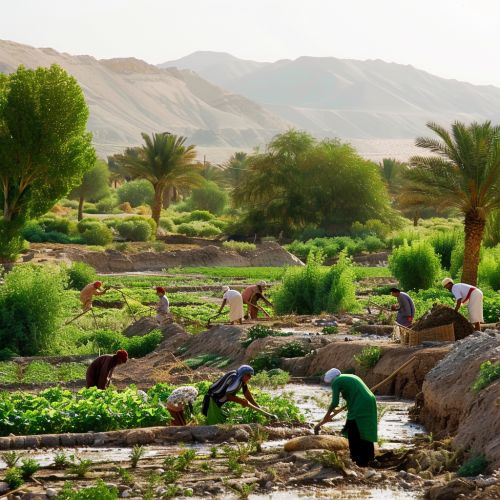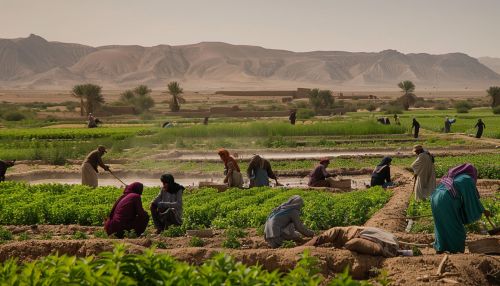Haratin
Haratin
The Haratin are a distinct ethnic group primarily found in the Saharan and Sahelian regions of North Africa, particularly in Mauritania, Morocco, Algeria, and Western Sahara. They are traditionally associated with oasis agriculture and have historically been marginalized and subjected to various forms of social and economic discrimination.
Historical Background
The origins of the Haratin are complex and multifaceted, involving a mix of indigenous Berber populations and sub-Saharan African peoples who migrated northward over centuries. The term "Haratin" itself is believed to derive from the Arabic word "hurr," meaning "free," which contrasts with their historical status as slaves or serfs in many Saharan societies.
In pre-colonial times, the Haratin were often enslaved by Arab and Berber tribes, who utilized their labor for agricultural work in the oases. This system of servitude was deeply entrenched and persisted into the colonial period. French colonial authorities in North Africa attempted to abolish slavery, but the social and economic structures that perpetuated Haratin subjugation remained largely intact.
Social Structure and Identity
The Haratin are distinguished by their unique social status, which has historically placed them at the bottom of the social hierarchy in Saharan societies. Despite their significant contributions to the agricultural economy, they have often been excluded from political and social power. This marginalization has been reinforced by racial and cultural prejudices, as the Haratin are typically darker-skinned than the Arab and Berber populations with whom they coexist.
The Haratin community is characterized by strong kinship ties and a sense of shared identity, which has been shaped by their common experiences of marginalization and resistance. Over time, they have developed distinct cultural practices, including unique forms of music, dance, and oral traditions.
Economic Activities
The Haratin have traditionally been engaged in oasis agriculture, cultivating crops such as dates, cereals, and vegetables. Their expertise in irrigation and water management has been crucial for sustaining agricultural production in the arid Saharan environment. In addition to farming, some Haratin have also worked as herders, laborers, and artisans.
In recent decades, economic changes and urbanization have led to shifts in Haratin livelihoods. Many have migrated to urban areas in search of better opportunities, although they often continue to face discrimination and limited access to resources.
Cultural Practices
The Haratin have a rich cultural heritage that reflects their diverse origins and historical experiences. Music and dance play a central role in Haratin culture, with traditional instruments such as the tidinit (a type of lute) and the tbal (a drum) being commonly used. Haratin music often features complex rhythms and call-and-response patterns, and it is performed at various social and religious events.
Oral traditions are also an important aspect of Haratin culture. Storytelling, proverbs, and poetry are used to convey historical narratives, moral lessons, and communal values. These oral traditions serve as a means of preserving the community's history and identity.
Contemporary Issues
Despite legal reforms aimed at abolishing slavery and promoting equality, the Haratin continue to face significant challenges. Discrimination and social exclusion remain pervasive, and many Haratin live in conditions of poverty and limited access to education and healthcare. Efforts to improve the status of the Haratin have been led by various civil society organizations and activists, who advocate for greater social and economic inclusion.
In Mauritania, for example, the Haratin have been at the forefront of anti-slavery movements, demanding the full implementation of laws that criminalize slavery and seeking reparations for past injustices. Similar movements have emerged in other countries, highlighting the ongoing struggle for Haratin rights and recognition.
See Also


